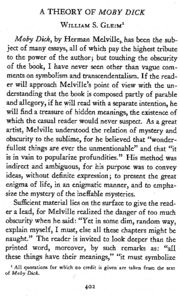A Theory of Moby Dick
From 1850s
Contents |
[edit] The New England Quarterly, Vol. 2, No. 3. (Jul.,1929), pp. 402-419
[edit] By William S. Gleim
[edit] Summary
A Theory of Moby Dick Intends to bring to light not the placement of the novel as concrete work of fiction, but rather as a vehicle of desire that Melville used to supplant his own theories on allegory and symbol. Gleim agrees to this and presents citations from biblical philosophers (Swendenborg, Carlyle, etc...) as well as citations from both Melville and Moby Dick themselves. He eventually examines the roles character's played within the novel to create an allegorical and imaged based mythology of Melville's work. All things considered, the article is more positive than negative, but is not a review; rather it is an exploration into Melville's intentions within Moby Dick.
[edit] Quotes
[edit] Quote #1
Melville's impassioned supplication reveals his intention to make the superficial story the vehicle for a deeper and darker conception... (405)
[edit] Quote #2
His method was indirect and ambiguous, for his purpose was to convey ideas, without definite expression; to present the great enigma of life, in am enigmatic manner, and to emphasize the mystery of ineffable mysteries. (402)
[edit] Quote #3
The characters of the three mates, Starbuck, Stubb, and Flask, are so thoroughly analysed in the chapter "Knights and Squires," that it is obvious they personify three of the Greek schools of philosophy, among which mankind is divided in a general way: Platonism, Epicureanism, and Stoicism. (411)
[edit] Quote #4
Next in importance come the harpooners, of whom Queequeg personified Religion, as may be inferred from his many devotions; Tashtego personified Sin, for he resembled "a son of the Prince of the Powers of the Air," and Daggoo personified Ignorance, for he was "the dark side of humanity"...
...furthermore that Queequeg, who personified Religion, served Starbuck who personified Platonism; and Tashtego, who personified Sin, served Stubb, who personified Epicureanism; and also that Daggoo, who personified Ignorance, served Flask, who personified Stoicism - all of them strictly in character. (412)
[edit] Quote #5
There is a striking parallel in the tragic ends of both Captain Ahab, of the Pequod, and Ahab, king of Israel. Both men were marked by fate...
...Josephus it was who wrote, commenting on the death of Ahab, King of Israel, "We may also, from what happened to this king, consider the power of Fate; that there is no way of avoiding it, even when we know it." (418-419

